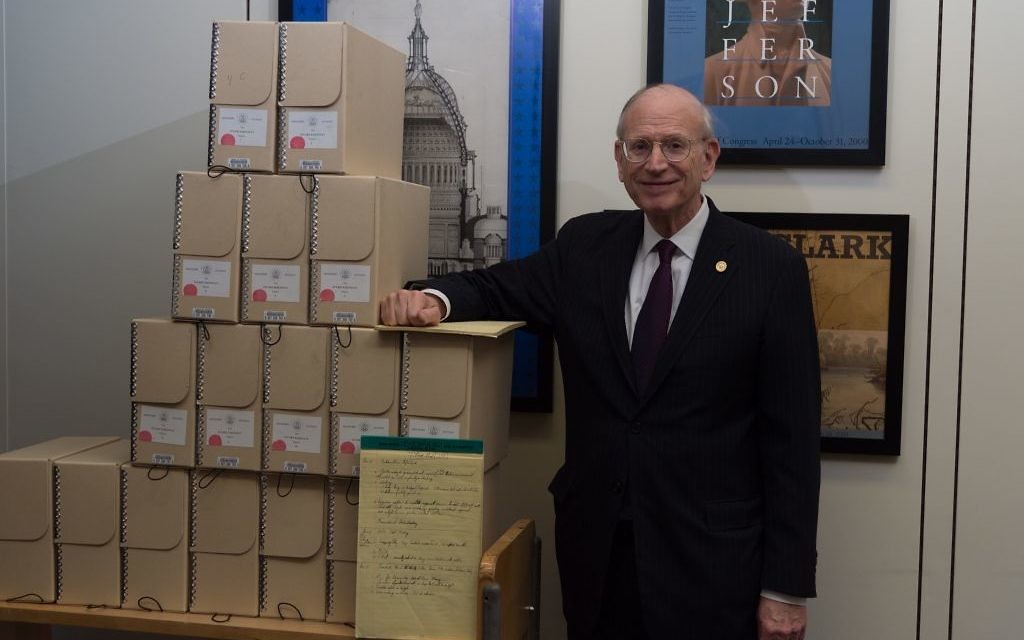Eizenstat Shines Light on Carter’s Achievements
The former White House chief domestic policy adviser challenges the "greatest ex-president" narrative.

Stuart Eizenstat is tired of Jimmy Carter being called our greatest ex-president — not because he disagrees about Carter’s accomplishments the past 37 years, but because that claim overshadows what he did in office from 1977 to 1981.
The native Atlantan and Ahavath Achim Synagogue member who served as Carter’s chief domestic policy adviser has produced a thousand-page book, “President Carter: The White House Years,” to set the record straight on the credit his ex-boss deserves for Middle East peace (40 years without a violation of the Egypt-Israel treaty), low inflation (thanks to Paul Volcker), transportation deregulation (from Southwest for passengers to FedEx and UPS for cargo), Latin American democracy, the doubling of national parklands, the release of Soviet refuseniks and arms control, to name just a few.
It has haunted him, Eizenstat said, that Carter suffered a humiliating electoral defeat to Ronald Reagan in 1980 despite accomplishing so much.
Get The AJT Newsletter by email and never miss our top stories Free Sign Up
“It’s hard for people to appreciate and to trace that line between something you did that didn’t immediately pay off in office and one that had a long-term tail effect in a positive way,” Eizenstat said in a phone interview. “I felt it was time to end this sort of one-dimensional caricature of someone who was a failed president.”
He said his candor in reporting on Carter’s mistakes — many reflecting his election as an outsider determined to clean up Washington after the Watergate scandal, such as his refusal to mix politics and policy — gives the book credibility and thus supports his assertion that Carter was an excellent president, especially considering that he had only one term to establish a legacy.
“A president should be judged on what he did and what long-term impact he had,” Eizenstat said.
That impact includes people as well as policies, and while Eizenstat doesn’t address the good Carter did by bringing him to Washington, where he served later administrations and won reparations for Holocaust looting, he does touch on the president’s role in elevating other future stars, including Supreme Court Justice Stephen Breyer.
More important, he shows us how Carter:
- Got into a mess with one close friend, Bert Lance, and underused another who was a political genius, Ham Jordan, who comes in and out of the story “because he did come in and out. He was not a part of policymaking,” Eizenstat said. He counted Jordan, who secretly was halachically Jewish, among the champions of Israel in the administration. “This was Ham as he was. I included everything I could about him.”
- Created a dissonance in foreign policy by picking Zbigniew Brzezinski as national security adviser and Cyrus Vance as secretary of state. Eizenstat said he warned Carter that either would be an asset to the administration, but both together would be a big mistake.
- Saw an early ally, Ted Kennedy, torpedo both their presidential dreams with a primary challenge that carried on to the Democratic convention largely because the United States didn’t veto an anti-Israel U.N. resolution right before the New York primary, a result of Carter’s mistaken belief that Jerusalem wasn’t included. “We saw campaign workers streaming out after the resolution vote,” Eizenstat said.
Still, it was Iran that sank Carter, Eizenstat said, and he hopes a deeper understanding of what happened will help him, such as the revelation that bending visa rules saved tens of thousands of Jews from being sent back to Iran.
He said Carter probably couldn’t have saved the shah, but he was right to try to keep him out of the United States. He said Carter should have considered mining Iranian harbors and shouldn’t have promised the families that no harm would come to the hostages.
Most important, Eizenstat said, Carter shouldn’t have made his administration a hostage to the crisis, including canceling a Chicago campaign appearance to fly back to Washington in a final, hopeless bid to free the hostages the weekend before the election.
All that and much more should give “President Carter” a broad audience, Eizenstat said, including “people who want to look at presidencies, who really admire presidencies, who go to presidential libraries, not just historians. It’s for people who want to know something about this whole era of the 1970s, the rise of the evangelical movement, the rise of the women’s movement, the gay rights movement. It’s for people who are interested in politics. … I think it should have a very heavy Jewish audience.”




comments